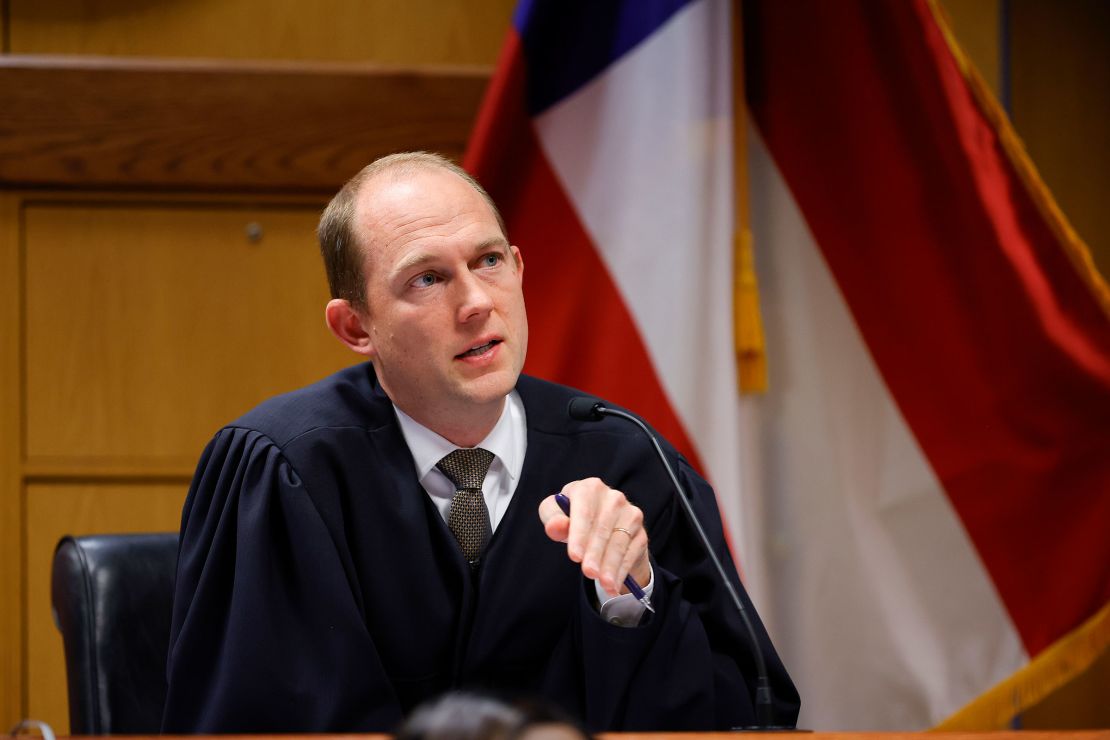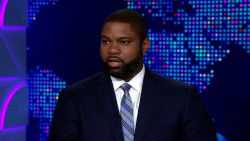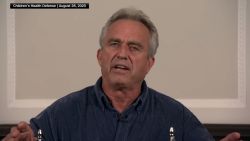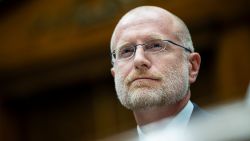Donald Trump’s attorneys on Friday sought to delay one of his criminal trials until after the November election and disqualify the district attorney prosecuting another case against the former president, in a split screen that underscored how all of Trump’s criminal cases can’t help but overlap.
In Florida, Trump’s attorneys told Judge Aileen Cannon his Mar-a-Lago classified documents case should wait until after the 2024 election. At roughly the same time in Georgia, attorneys for Trump and his co-defendants made their final arguments to Judge Scott McAfee in a bid to disqualify Fulton County District Attorney Fani Willis in the Georgia racketeering case over her relationship with special prosecutor Nathan Wade.
Neither judge made a decision on Friday. But both hearings could have a significant impact on when – or whether – Trump will face trial in each of those two cases.
Trump’s legal calendar remains a jumble of pre-trial legal motions, with three of the four trials still in limbo. In addition to Florida and Georgia, special counsel Jack Smith’s election subversion case in Washington remains on hold with the Supreme Court set to hear arguments on Trump’s presidential immunity claims next month.
The only case that appears set: Trump’s New York criminal trial will begin March 25, which Trump’s attorneys said was a “firm” date in court Friday.
Here are takeaways from another busy day in Trump’s legal proceedings:
Defense attorneys accuse Willis and Wade of ‘fraud on this court’
A parade of defense attorneys in the Fulton County racketeering case argued that Willis should be disqualified, stating that she lied about her relationship with Wade and received benefits from him in the form of trips.
Friday’s hearing marked the final arguments in the case before McAfee rules on whether to disqualify Willis, after several weeks of testimony that included Wade and Willis both taking the stand.
Craig Gillen, a defense attorney in the Georgia election subversion case, accused Willis and Wade of committing “fraud on this court” when they claimed Wade did not provide any financial benefit to Willis in their relationship.

“We’ve got all the records showing, from Mr. Wade, about the payment for these trips, for the cruises, for the flights, all this stuff,” said Gillen, who represents David Shafer, the former Georgia Republican Party chairman who is one of the defendants in the case.
“What’s the only way that they can save themselves? Pay no attention to the records, pay no attention to that, they can save themselves? Pay no attention to the records, pay no attention to the airlines, into the flights and vacations and the cruises – I paid him back in cash,” he added.
Willis testified that she paid back Wade in cash for the flights and other expenses he paid for on their trips. But Gillen argued that they could not come up with any records showing repayments.
“Show us your receipts. Where did you take cash out of the bank ever? I don’t have any. Well, show us the deposits that he had. Well never, we don’t have any,” he said. “Just please trust us and believe us, because it’s our only way out of the trap that they set for themselves.”
Gillen concluded: “Prosecutors don’t act like this. Lawyers don’t act like this. These people, your honor, is a systematic misconduct. And they need to go.”
Judge Cannon doesn’t tip her hand on trial date in Trump’s classified docs case
In the classified documents case, Cannon didn’t tip her hand Friday on when she might set a new trial date, but she asked questions about the prospect of holding a trial close to Election Day with the former president likely on the ballot.
Special counsel Jack Smith has asked for a July date, while Trump’s attorneys asked in filings for the trial to begin in August – though they argued they actually wanted it after the November election.
An attorney for Trump, Todd Blanche, also called into question whether having a trial near the November election would be election interference on the part of the Justice Department.
“It’s the court’s decision and no one disputes that,” Blanche said of the trial timing, while adding that prosecutors should answer the question of whether “it would be complete election interference” to hold a trial close to the election.
Prosecutor Jay Bratt criticized defense attorneys for proposing a trial date in August despite their argument in court Friday that a trial before the November election would be “unfair.”
“Those are fake dates,” Bratt said of the August proposal from Trump’s team. “Why did they even propose those dates?”
Cannon asked relatively few questions during the morning session.
Trump attended Friday’s hearing, though he did not speak publicly inside or outside the courtroom. Compared to past hearings in the courthouse, where Trump sat at the defense table, he appeared to be relatively relaxed and listening passively. He whispered a few times with his attorneys flanking him — but it was a less tense room than at previous hearings.
Prosecutors, Trump attorney spar over claims of special counsel ‘collaboration’ with other agencies
Much of Friday’s hearing on scheduling in the classified documents case against Trump focused on the former president’s demands for more discovery from various government entities – including the Biden White House – because, he claims, those agencies are part of the prosecution team in the case.
Prosecutor David Harbach argued Friday that holding a hearing on the discovery request, as Trump is requesting, was unnecessary and unwarranted. Trump is alleging that the Biden administration had conspired to bring the charges against Trump to hurt his 2024 election campaign. Harbach called Trump’s theories “baseless” and said that the defense lawyers had not been able to point to a court precedent that would support their demand for a hearing on the matter.
“They need to show the court the case,” he told Cannon.
Emil Bove, an attorney for Trump, argued that prosecutors had coordinated with leadership at the FBI and other national intelligence leaders to review classified documents in the case, and that those individuals were advised on how to use certain documents in the case.
Cannon pressed Harbach on his claim that a hearing wasn’t necessary. “You don’t think there are factual disputes that are pertinent” to her decision on whether the prosecution team extends to the other agencies and offices, she asked.
When Trump’s attorneys argued for the hearing, Cannon pushed them to describe how they could narrow its scope and asked them to lay out specifically what a hearing would examine.
Holding such a hearing would slow the pace of the case and could cause significant delays in getting the prosecution to trial.
Judge suggests discipline, not disqualification, could be the solution if Fani Willis lied
In the Georgia case, McAfee suggested Friday that if it ends up that the lead Fulton County prosecutors lied on the witness stand about their romantic relationship, the remedy might be a professional disciplinary action at the state bar, instead of the much more aggressive step of removing them from the Trump case.
“The proposition you are putting forward now is that if a representative of the state, the lead prosecutor, the district attorney themselves, says something that is untruthful in the record, that is something that immediately has to be proactively policed by the trial court?” McAfee said. “Basically, what I’m getting at is, where in the law do we find the remedy to an untruthful statement? Generally, we sent you down the street to the bar.”

Just because McAfee asked the question, it doesn’t necessarily mean that was how he is leaning.
McAfee also raised questions about the evidence in text messages from Wade’s former law partner Terrence Bradley about his knowledge of a relationship between Wade and Willis.
Donald Trump attorney Steve Sadow argued that Bradley – who had texted “absolutely” in a message to another defense attorney when asked if he thought the Wade-Willis began before she hired him as special prosecutor – was purposely evasive in his testimony claiming he was speculating about the timeline.
Bradley’s text message has been a key piece of evidence the defendants have put forward in their bid to disqualify Willis, arguing that it shows Willis and Wade lied about when their relationship began.
McAffee, however, raised questions about what could corroborate Bradley’s text if Bradley’s testimony was “impeached.”
“If we take that view that he thoroughly impeached himself, that he did not give truthful conduct. What’s left standing?” McAfee asked.
“Usually if a state has a witness that goes sideways, they’ve got them locked in. They’ve sat down with a detective. They’ve got a full statement. We don’t have that here,” McAfee continued.
Sadow argued that Bradley’s text message should be considered such a prior statement.
“What you have is a text message, which is a prior statement of Bradley that he did on his own. That was not given to him by someone,” Sadow said.

























